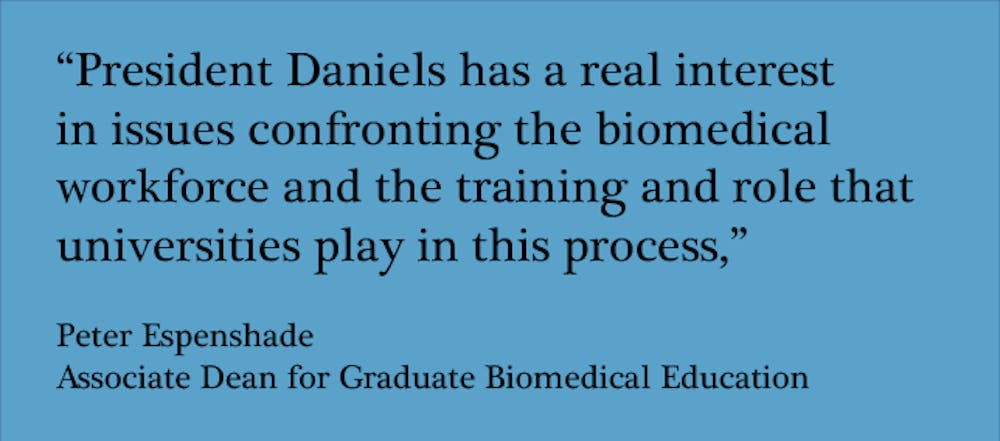In December of 2017, Hopkins announced it would be part of a coalition of 10 universities and research institutions working to release data on PhD and postdoctoral scholars’ admissions, demographics and career prospects.
The Coalition for Next Generation Life Science emerged out of the concern that students pursuing careers in the life sciences do not have access to information related to career options both inside and outside of academia. It aims to increase transparency about the outcome of PhD candidates so that students can make informed choices when pursuing careers in the life sciences.
The Coalition released their first round of data on Feb. 1, 2018. The report includes statistics on admissions, enrollment and completion rates for PhD students. The Coalition plans to report more information on the demographics of postdoctoral scholars in July of 2018.
The Coalition for Next Generation Life Science is co-funded by the Gordon and Betty Moore Foundation, a nonprofit organization, and an anonymous donor.
Elizabeth Watkins, dean of the graduate division at the University of California, San Francisco, along with Peter Espenshade, associate dean for graduate biomedical education at the Johns Hopkins University School of Medicine, co-lead the Coalition.
Additionally, University President Ronald J. Daniels played a leading role in creating the Coalition for Next Generation Life Science.
“President Daniels has a real interest in issues confronting the biomedical workforce and the training and role that universities play in this process,” Espenshade said in an interview with The News-Letter.
In particular, Hopkins and other institutions found that a large number of PhD candidates and post-doctoral students are competing for a limited number of tenure-track and faculty positions at universities. Therefore the release of data aims to potentially help students discover alternate career paths.
“Many people go to graduate school thinking that they want to be in academia, and there just aren’t enough positions,” Espenshade said. “People tend to not confront this reality when they are entering PhD programs, but this [releasing data] provides more information.”
The data released from Hopkins this month provides information on 22 PhD programs spanning across the schools of arts and sciences, engineering, public health, and medicine.
The coalition plans to release more information on different aspects of post-doctoral and doctoral programs over the next year and a half.
Molecular and cellular biology junior Vivian Jou said that she is happy the University is giving some attention to PhD programs and the field of academia in general.
“There are pre-med advisers and guidance for other pre-professional routes, but there is not any real guidance for people who want to go into academia,” Jou said. “So it’s nice that Hopkins is highlighting the research route with this new study.”
Jou added that although she is interested to read the information that the coalition gathers and publishes, she doesn’t think it will affect her decision to get a PhD degree.
“It can never hurt to have more data. But I don’t think it’s significant enough to impact my career choice, because I’m already pretty set on getting a PhD,” Jou said.
Additionally Espanshade said that other universities are reaching out to join the coalition and adopt the same reporting standards for their programs. Some universities report this type of data for all of the PhD programs, and this could be the beginning of a larger effort at Hopkins as well as other institutions to increase the amount of information shared about PhD and postdoctoral programs.
“I think that another goal of the coalition is to encourage other institutions to do the same thing,” Espensahde said. “Through this effort we hope to catalyze a broader national effort around data transparency.”





